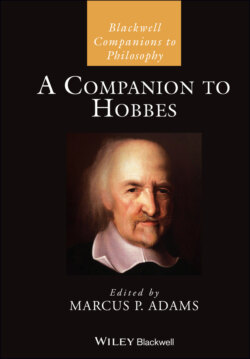Читать книгу A Companion to Hobbes - Группа авторов - Страница 16
2.4 Religion
ОглавлениеHobbes identifies language as a double-edged sword: linguistic ability is a prerequisite for science and other forms of cooperative activity, but used improperly it may lead users to hold beliefs that lead them astray. Language plays a central role in Hobbes’s criticisms of Scholastic metaphysics, and Hobbes’s alternative approach to language was meant to reform its usage. Luc Foisneau’s chapter “Against Philosophical Darkness: A Political Conception of Enlightenment” shows how this critique, in particular Hobbes’s assault on the notion of separated essences, concerns not only claims in metaphysics but also has a broader political end: to show that the language used by the Catholic Church promotes control of citizens’ minds. Tracing these criticisms through Hobbes’s account of schools in Greek and Jewish antiquity, Foisneau demonstrates that Hobbesian enlightenment is accomplished through state institutions and only by using vernacular language, not the language of Scholastic darkness. Such enlightenment for Hobbes is possible only within the state.
Michael Byron’s chapter “Hobbes on Submission to God” addresses the nature of what it means for a human to submit to God. To do this, Byron examines Hobbes’s discussion of the “Kingdom of God by Nature” in Leviathan 31, understanding Hobbes as committed to a primary state of nature, which is inhabited by atheists, and a secondary state of nature, which is inhabited by subjects of God’s natural kingdom. To refine these notions, Byron differentiates subjects of this kingdom not only from atheists but also from non-human animals and deists. Reconstructing Hobbes’s account, Byron argues that humans are members of the natural kingdom of God if and only if they acknowledge God’s providential involvement in the world. Atheists are excluded because they deny God’s existence and deists because, while they believe that God exists, they deny God’s providence. Byron furthermore argues that according to Hobbes the act of acknowledgement, unlike that of belief, is voluntary.
Hobbes’s extended treatments of topics related to ecclesiology and theology in Leviathan Parts III and IV set that work apart from Hobbes’s prior works in civil philosophy. Indeed, it is striking that the third part of Leviathan (“On the Christian Commonwealth”) is the longest part of that work. Jeffrey Collins’s chapter “Hobbes and the Christian Commonwealth” examines Hobbes’s usage of the phrase “Christian Commonwealth” by first looking to occurrences of that phrase and related phrases by authors preceding Hobbes and then by showing the different purposes for which Hobbes used the phrase, from his ecumenical use in Elements of Law to uses in Leviathan that are informed by worries about the power of clerics. In the latter, Collins shows how Hobbes first openly rejects Catholic notions of a single Christian commonwealth under Rome and insists, against the views of Bellarmine, that sovereignty lies only in a state and that a sovereign need only endorse minimal theological claims.
The extent to which Hobbes’s sovereign could countenance religious toleration is the focus of Johann Sommerville’s chapter “Hobbes and Toleration.” Sommerville discusses the context in which Hobbes’s concerns related to religious belief and practice emerged and shows that Hobbes viewed toleration of non-Christians as compatible with natural law. Hobbes held that the sovereign should have absolute power and could prohibit religious activities that the sovereign viewed as a threat to the security of the state. Although no religious group would receive a permanent right to toleration according to Hobbes’s model of the state, since circumstances may change and warrant different laws concerning public behavior, nevertheless a range of religious actions and organizations that posed no threat and did not break the law would be permitted.
The amount of space Hobbes devotes to the topic “Of Power Ecclesiastical” in Leviathan 42, as well as his detailed focus upon Cardinal Bellarmine’s arguments, may seem initially puzzling. Franck Lessay’s chapter “Hobbes, Rome’s Enemy” traces this in-depth attack on Bellarmine to broader concerns of Hobbes’s with Roman theology and to his views related to political power. In particular, Lessay highlights Hobbes’s attack on the notion of the “indirect power,” which Bellarmine claimed Rome possessed, showing that for Hobbes this notion was merely a cover for what was in fact direct power. In other words, although advocates of the notion of “indirect power” relied upon a distinction between temporal and spiritual power, Hobbes argues that ultimately it reduced to Rome asserting direct power when it claimed doing so was necessary; it amounted to Rome having the ability to “depose Princes and States” if deemed necessary “for the Salvation of Soules” (Hobbes 2012; 1651, 910). Lessay shows how Hobbes’s renouncement of this notion, along with the location of power within civil sovereigns alone, led to the rejection of his views by Anglican contemporaries and later Catholic thinkers alike.
In the chapter “Hobbes and the Papal Monarchy,” Patricia Springborg argues that the papal monarchy served as the model for the Leviathan in Hobbes’s Leviathan but also was the subject of Part IV of the Leviathan (“Of the Kingdome of Darknesse”). Springborg’s chapter links Hobbes’s Leviathan with his later works, in particular the Latin poem Historia Ecclesiastica, and details Hobbes’s criticisms of the papacy by showing his analysis focused on three papal strategies: first, papal claims to imperial power by means of a transmission of power from Rome; second, co-opting of Roman law as canon law; and third, the creation of an ecclesiastical system of offices paralleling the administrative offices of the old Roman Empire. Tracing the decline of the papal monarchy not only to its overreach but also to the limits of its philosophy of mind, Springborg shows Hobbes’s indebtedness to the canon law tradition alongside his criticisms, in particular related to Hobbes’s understanding of the artificial person of the state.
